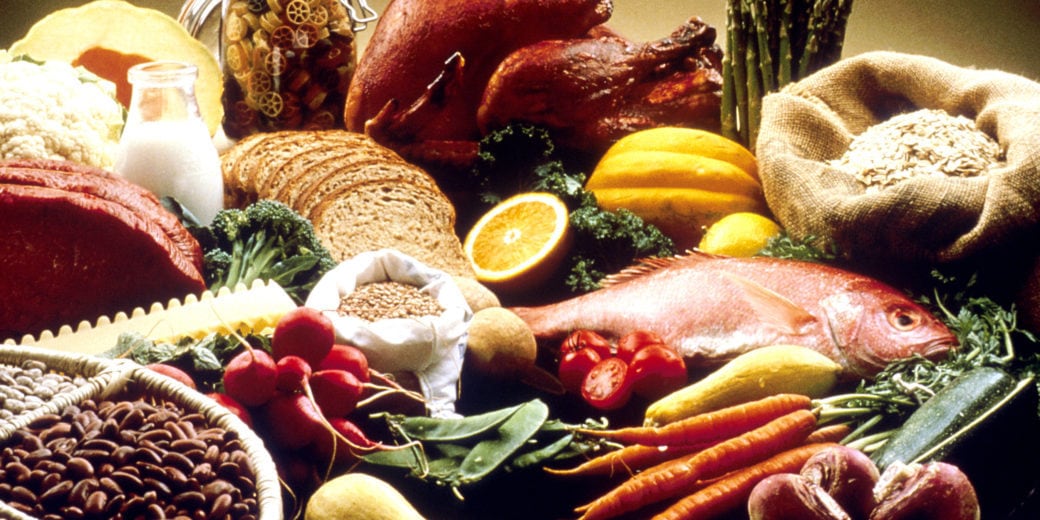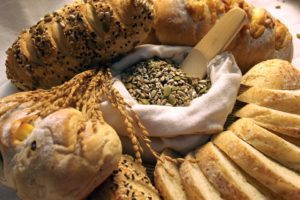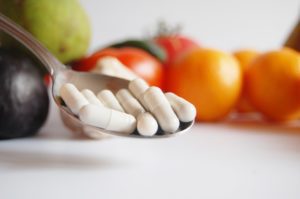Understanding The Biology of a Great Muscle-Building Workout Diet

Workout diet articles, litter the internet but very few actually give you insight on how your body works and how these nutrients affect your body.
In this article, we are going to share information about vital nutrients which should be present in any workout diet.
We are also going to discuss common practices associated with dieting and how you can effectively manage it.
Learning Basics: Choose What You Eat!
Our body is an opportunistic eating machine.
Humans are naturally omnivorous which means that we can digest and draw nutrients from both animal and plant sources.
This gives us a wide variety of choices when it comes to the selection of food.
It is essentially important that our body gets a wide variety of nutrients from the food which we eat.
This holds true for certain vitamins such as vitamin C and vitamin D which are only obtainable from other sources since our body can’t manufacture them.
We also need to get necessary minerals such as zinc, potassium, and magnesium to help the body function properly.
For us to understand how these nutrients help the body, we need to go over in detail the interconnected relationships they share.
Lets first start by enumerating the food groups which are:
- Carbohydrates
- Vitamins and Minerals
- Protein
- Fats and Oils
Understanding these general food groups is essential to understanding why our body needs them that much.
It also helps us appreciate the process where our body makes use of these essential elements when building not just muscles.
The body can utilize these nutrients to repair healthy cells, dispose of unhealthy ones, defend against sickness, and so much more.
The Carbohydrates
 The group consists of foods which gives energy to the body mostly in the form of simple sugars and starches.
The group consists of foods which gives energy to the body mostly in the form of simple sugars and starches.
One misconception about the function of carbohydrates is that in a diet,
Its role is mostly devoted only to giving energy.
Wherein, in fact, the body can get energy from protein and fats.
Another misconception is that food sources such as grains are mostly carbohydrates.
This is proven false since they can also contain trace minerals, vitamins, and protein.
Carbohydrates come in two common forms simple sugars and starches.
Simple sugars are what the body calls instant energy boosters while starches are what it calls energy over time.
Simple sugars includes monosaccharides (glucose, fructose,and galactose) and disaccharides (sucrose, lactose, maltose).
Starches also known as complex sugars are a complex chain of carbohydrates which are commonly found in plant matter and root crops such as legumes, carrots, and potatoes.
Carbohydrates are generally found in abundance as food products derived from plants such as fruits and bread.
The only exception is with galactose and lactose which is a sugar found in milk and milk products such as cheese and butter.
Vitamins and Minerals
 Vitamins and Minerals generally have the same function in the body,
Vitamins and Minerals generally have the same function in the body,
Wherein they help in maintaining the body’s normal functions.
The difference between the two is that vitamins are organic while minerals are inorganic.
Plants and animals create vitamins through special processes involving enzymes and metabolic action.
On the other hand, minerals occur in trace amounts in the soil which are absorbed by plants and then eaten by plant-eating animals.
Vitamins and minerals in controlled and manageable amounts help the body drastically.
The roles which they help regulate the body function ranges,
From the barely noticeable such as regulating blood pH to the crucial such as fighting cancer cells.
These nutrients, although taken in minute amounts at any given time, should not be disregard.
Understanding Vitamins
Vitamins can be water-soluble or fat-soluble,
Fat-soluble vitamins include Vitamins A, D, E, and K.
Vitamin C and the B Vitamins meanwhile are water-soluble.
The water-soluble vitamins are never stored in any particular tissue and are then excreted through the process of urination.
Fat-soluble vitamins are stored in the fatty tissues of the body also known as adipose tissues which makes them harder to get rid of.
Understanding the Minerals
Minerals are most abundant in plant sources but are also found in plant-eating sources of meat.
The body cannot manufacture minerals the same way it would vitamins (except Vitamin C).
It, therefore, must be obtained through other sources such as plants and other animals.
Minerals are only needed in trace amounts in any workout diet as they can become poison to the body.
Iron is probably the most commonly known mineral since lacking it is tied to anemia.
Proteins
 Protein is known as the building block of living tissue.
Protein is known as the building block of living tissue.
Its abundance in the human body ranges from basic cells to entire organ systems.
It is most commonly accessible in two forms,
Plant protein is present in plant-based foods such as fruits and vegetables.
Animal protein is abundant in meat from livestock and poultry, seafood, and milk products.
Over-consumption of protein is very unlikely to kill you while the lack of protein will.
A condition called hypoproteinemia usually occurs in malnourished people without proper access to protein-rich food sources.
As protein is a necessary nutrient for the body to be able to replace, repair, and renew cells and tissues.
You need it to be able to grow muscles and to stay fit since it also helps in the creation of hormones and antibodies.
Understanding your main source of protein can be pivotal in how you approach muscle-building.
Most animal sources of protein also contain some kind of fat.
Meanwhile, plant protein is not readily available and easily exploited by the body.
It is for this reason that vegetarians need to take in more protein from either supplement or to take advantage of protein-rich plants such as soy.
Fats and Oils
 It is probably the most misunderstood nutrient in the body.
It is probably the most misunderstood nutrient in the body.
Over the years many skeptics and mass media hype has led to the shaming of fats and oils.
However, it is slowly being accepted as a necessary nutrient in mainstream media.
Fats actually help fuel the body as an alternate energy source or in the production of hormones.
Steroid hormones particularly require cholesterol as a necessary component.
One of the negative stigmas associated with fats is that it can cause arteries to clog as well as a host of other problem.
Although it does have its problems if consumed in excess,
Fats also known as lipids are actually complex than previously thought.
The fatty acid known cholesterol has several forms two of which are;
High-Density Lipoprotein (HDL) in particular is the “good cholesterol,”
HDL’s primary role is to absorb other lipoproteins either for excretion or consumed by the body.
Low Density Lipoprotein (LDL) is the “bad cholesterol,”
It is less dense and smaller than HDL and tends to stick to the arterial walls which when numerous can cause it to clog.
Advanced Application: Components of a Workout Diet

Macro and Micro Nutrients
Understanding the relationship between minerals and their roles in the body can be grasped through the use of the terms “micro” and “macro” nutrients.
Micronutrients include minerals such as Iron (Fe), Manganese (Mn), Zinc (Zn), Copper (Cu), Molybdenum (Mo), Nickel (Ni), and Vitamins.
The body only needs these minerals in minute amounts.
As large doses of these micronutrients can cause adverse effects to the body.
Micronutrients such as iron and zinc are more useful in the body in small doses.
The body uses iron in the formation of hemoglobin,
A component in the blood which is necessary for transporting oxygen to tissues and cells.
On the other hand, the body uses zinc in creating enzymes and antibodies
They help maintain the function of the immune, lymphatic, endocrine, and other organ systems.
The opposite is true for the “macro” side of the spectrum.
Macronutrients generally include Carbohydrates (Simple Sugars and Starches), Protein (Amino Acids), fats and oils (Monosaturated, Polysaturated, Saturated, Essential Fatty Acids).
Majority of which helps perform an integral part in keeping the body healthy and functioning properly.
Carbohydrates are the energy givers, but they can also be the fat builders if consumed in large amounts.
Proteins are the building blocks of healthy muscles and responsible for repairing cells and tissues.
Fats and oils are responsible for the production of steroid hormones and the protection of vital organs.

How Much is too Much?
Vitamins while organic can still cause damage to the human body if produced or consumed in excess, the same goes to minerals and any other nutrients. –
A condition called “Hypervitaminosis” occurs when the body has too much of a specific vitamin, meanwhile the opposite is called “Hypovitaminosis” which occurs when the body lacks a specific vitamin.
While it is hard to tell how much one person needs certain vitamins as the needs vary from person to person.
If you plan to take vitamin supplements, it would be advisable to talk to a clinical dietitian or a physician to avoid complications with your workout diet.
Minerals follow the same principle as vitamins – too much is bad.
Excess minerals in the body can severely damage organs particularly to the liver and the kidneys.
This principle applies to not just the micronutrients but also the macronutrients.
While naturally, you won’t encounter problems if you are eating normally.
It becomes a different field if you introduce food supplements, vitamin pills, and mineral-enriched drinks into the picture.
Having too much of any nutrient is bad, and it puts a strain in your body to use and remove this extra baggage.
So practicing moderation and always seeking advice from professional is the only way to go.
Managing Success: The Balancing Act
Workout Diet Specifics
1. Eating less than desirable amounts of carbohydrates coupled with lack of fats in the workout diet will actually cause the body to start breaking down muscles for energy.
Over the years health enthusiasts and fanatics have slammed sources such as grains to be unnecessary in muscle building.
While carbohydrates do in fact help in the creation of fatty adipose tissues.
It doesn’t mean that you have to remove it entirely.
It is counter-productive for anyone building muscles to remove carbohydrates in their workout diet.
As lacking such an abundant source of energy will cause the body to search for alternatives such as fats (ketones) and protein.
Protein is stored in the muscles which the body begins to break up in times where carbohydrates and fats are not readily accessible.
This makes building muscles even harder.
2. In any workout diet, a healthy dose of necessary fatty acids can actually help in weight loss and improve muscle-tone definition.
The hormone testosterone actually helps in maintaining muscle tone in males.
It can only be made by the body if there is a sufficient amount of cholesterol and other nutrients.
It works by helping in muscle growth and preventing extra energy become stored as fat.
3. Never take anything in excess in prolonged periods of time and also never devoid yourself of necessary nutrients for prolonged periods at a time.
One of the things people tend to advertise with diets is the concept of going cold turkey on your favorite food.
In theory and its writing, it might be a good idea, but it does have a negative effect on the mental well-being aspect of your workout diet.
It should be noted that going cold turkey may have long term effects it tends to forgo the current short term problems.
Withdrawals are one of the obstacles when going this path and another is binge eating.
It occurs when the body starts craving the tastes which it has accustomed to due to a change of diet.
It then leads to periods where you “cheat” and start binge eating sessions which does your workout diet no justice.
One way to curb this problem is to slowly take what you are accustomed away by not removing it entirely.
Start by eating smaller and smaller portions until you remove it in your system.
This way you’ll be able to free yourself of the pressure and get you started in moving forward.
A workout diet should never be a gamble,
It surely is not a game of chance.
It takes hard work and determination to get you going
so try hard, work harder, and train hardest
– H.F.V –
Additional Reading:
Nutrition:

